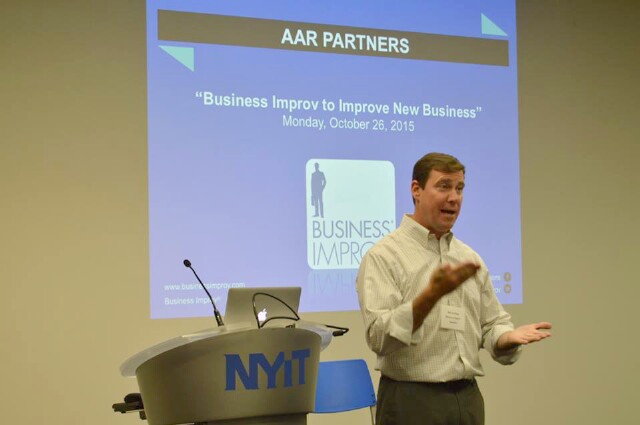Using Improv to Improve New Business

Made famous by sketch shows like "Whose Line is it Anyway?" and UCB comedians, improvisation has become a much-loved form of comedic entertainment. But what happens when improvisation takes a less likely route and is applied to business practices? After an evening at Access Confidential’s “Business Improv to Improve New Business” workshop, it turns out there are more than a few lessons that can be borrowed from improv to enhance interactions with coworkers and clients.
Below are key takeaways from the interactive, high-energy event, hosted by Business Improv CEO and Co-Founder Bob Kulhan. (P.S. Kulhan, pictured at top, was trained by Tina Fey, so you know he’s good!).
1) React, Adapt, Communicate
“React, adapt, communicate” was the mantra of the night. Keep these three steps in mind, be present in the moment and you can tackle anything, Kulhan advised. He then put the group to the test. Almost as quickly as we sat down, we were running around the room, challenged with improv exercises and pushed out of our comfort zones. In one activity, we had to quickly formulate a story based on a single statement from a person we just met. My partner declared, “You are a worm!” and I soon found myself telling an elaborate tale about the dangers of floodwaters and hungry robins. Hey, you go with what you’re given or, rather, you “react, adapt, communicate.”
2) The Power of “Yes, And…”
Those with some improv training may be familiar with the “Yes, and” rule, which means instead of negating someone’s comment, you accept it at face value, and add on to it -- a technique that is meant to promote collaboration and open-mindedness. As we began a new exercise, where each attendee had to offer a counterpoint to their partner’s statement, it was hard not to slip into the negative and much easier phrase, “Yes, but …” As we continued, the activity proved a lesson in mindfulness, making many aware of how often their first reaction is to say “no.”
3) Practice is Key (Even in Improv!)
“Plans are worthless, but planning is everything,” Kuhlan explained. You can’t plan for every specific scenario, but you can practice the process of “react, adapt, communicate,” which gives you the tools to handle unexpected business hurdles. Teams who collaborate the most effectively have these steps down flat.
4) Embrace the Awkward
Like learning to ride a bike, Kuhlan emphasized, the first time you try something -- whether it’s improv or giving a presentation -- it’s likely to make you feel uncomfortable. While certainly awkward at first, each new exercise felt a little less daunting than the last -- and surprisingly fun as we bantered back and forth with new partners. In order to overcome “collaboration blockers” in the business world, including fear of rejection or judgment, egos and bad workplace habits, Kuhlan continued, you have to work out the kinks and adjust your energy and attitude. Again, the more you practice, the more effective your communication will be.
The opinions and points of view expressed in this commentary are exclusively the views of the author and do not necessarily represent the views of MediaVillage/MyersBizNet management or associated bloggers.

